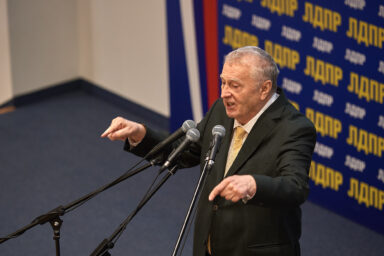Sympathy for Ukraine Highlights Western Apathy Toward Other Conflicts
An Iranian American feels empathy with beleaguered Ukrainians but resents the lack of a global response to the suffering of Muslim and dark-skinned war victims.
|
Listen To This Story
|
Watching the brutish Russian invasion of Ukraine and the West’s reaction, I cannot help but think about my childhood in the United States post 9/11, growing up as a Muslim Iranian American girl.
I remember this feeling, even as a child, when my rows of Barbie dolls included none that looked like me. As a teen, I hid my ethnic origin because even the faintest mention of Islam or Iran ignited contention rather than celebration of my beautiful culture.
The only time growing up that I saw children with my complexion in the media was when their lifeless bodies lay in their fathers’ arms in war-torn countries. This taught me one thing:
Black and brown people, especially those who do not reside in the West, represent a statistic — not individuals of any value.
Today, with Russia invading Ukraine, I can’t help but notice the stark differences in the media’s portrayal of Ukrainian victims and survivors compared to how those who looked like me were depicted during the US invasions of Iraq and Afghanistan. American sympathy for Ukrainians and public disdain of Russia contrast sharply in my mind with how the Middle East came across and is cast to this day as some ongoing dark land of war and crisis.
It seems evident to me that this deep empathy results from the fact that Ukraine is predominantly white, Christian, and European, unlike the country from which my family emigrated.
During the first days of the Iranian hostage crisis in Tehran in 1979, some 300 Western reporters descended on Tehran, but, according to journalism professor William A. Dorman, only one spoke Farsi, and few were “knowledgeable of the local scene.” During the biggest crisis in US-Iran relations, media outlets did not prioritize finding native speakers to properly translate and contextualize the events.
When the only representation of us in news media for roughly half a century has mirrored this pattern, what more should we expect from the general American populace?
According to the UN Refugee Agency (UNHCR), about 13.4 million Syrians need humanitarian assistance. Close to 23 million Afghans “are in acute food insecurity,” with over 3 million children at risk of severe malnourishment. Some 4.1 million Iraqis need aid. And in Yemen, more than 20 million people are in crisis with the whole country a step away from nationwide famine.
Between 1992 and 1995, thousands of Bosnian Muslims were murdered in a war sparked by the splintering of Yugoslavia. In remote Srebrenica alone, 8,000 Muslim men and boys were slaughtered by Bosnian Serbs — Christians — many of whom still deny that anything close to genocide ever happened. The UN had troops in Bosnia but did not stop the massacre. Indeed, the international community forbade Muslims from arming, the opposite of what is happening in Ukraine today.
People did not rally in defense of Bosniaks the way the international community is now rallying for Ukrainians because of xenophobia and a lack of regard for people who do not conform to Western norms.
I can’t help but feel some resentment about the collective outcry now being voiced for Ukraine.
To this day, people justify violence in Iran and Iraq on the grounds of 9/11, while overlooking or excusing aggression in Yemen. They explain away conflicts in the Balkans and Syria as unavoidable and unfixable problems stemming from centuries-old internal conflict. Yet, point out that stark contrast with the suffering in Ukraine, and you more than likely will be accused of lacking sympathy.
No one actually feels more sympathy.
So, when I see Ukrainian refugees being welcomed, accepted with open arms and supplies into countries like Poland and Spain, I can’t help but think about African migrants being shunned at those same borders with Ukraine or being routinely beaten by Spanish police. When I see the day care and trauma counseling offered for uprooted Ukrainian children, I can’t help but grieve for the thousands of Yemeni children malnourished and starving in a war supported by the West.
They do not have the white skin and blue eyes of unproblematic refugees.
Internationally renowned journalist Peter Dobbie epitomized this sentiment on Al Jazeera, saying, “[The Ukrainian refugees] are prosperous, middle-class people; these are not obviously refugees trying to get away from areas in the Middle East that are still in a big state of war. These are not people trying to get away from areas in North Africa. They look like any European family that you would live next door to.” CBS reporter Charlie D’Agata reiterated that sentiment when he said that Ukrainian residents are “relatively civilized” compared to Iraqis and Afghans.
Biased coverage of Middle East deaths pre-dates 9/11. The Palestine-Israel conflict in the late 1940s established the kind of racist coverage we also saw in the wars in Afghanistan and Iraq. The Arab and Middle Eastern Journalists Association recently condemned such coverage:
This type of commentary reflects the pervasive mentality in Western journalism of understating and glossing over tragedy in parts of the world such as the Middle East, Africa, South Asia, and Latin America. … It dehumanizes and renders their experience with war as somehow normal and expected.
In 2001, Rep. Barbara Lee (D-CA) was the lone member of Congress to vote against the Afghanistan War. The Watson Institute for International and Public Affairs estimated that at least 929,000 people have been killed by direct war violence in Iraq, Afghanistan, Syria, Yemen, and Pakistan.
According to the UN Refugee Agency (UNHCR), about 13.4 million Syrians need humanitarian assistance. Close to 23 million Afghans “are in acute food insecurity,” with over 3 million children at risk of severe malnourishment. Some 4.1 million Iraqis need aid. And in Yemen, more than 20 million people are in crisis with the whole country a step away from nationwide famine.
Although my heart goes out fully to Ukranians suffering from the war Putin is waging, I wish the same global response were roused by the plight of Middle Eastern victims and survivors of unjust wars sparked by Western imperialism. I wish that the same outpouring of support could flow for the thousands of dark-skinned, dark-eyed refugees across the world who, like Ukrainians, only want basic needs and a new, safe home.
I just wish the same empathy for those who resemble me.
Ariana Afshar is a political content creator. She earned her journalism and political science degrees from California Polytechnic University – San Luis Obispo.




